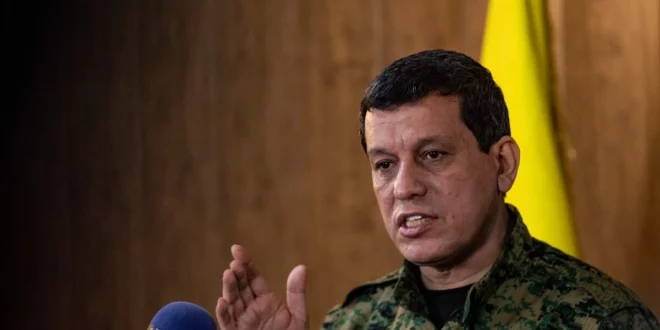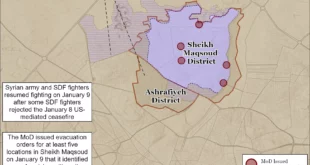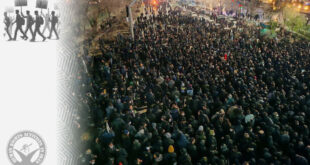Mazlum Abdi, commander of the Kurdish-led Syrian Democratic Forces (SDF), has said he is ready to travel to Turkey and meet with jailed Kurdistan Workers’ Party (PKK) founder Abdullah Öcalan, as Turkish lawmakers plan to make the first parliamentary visit to his island prison under a new peace initiative.
Abdi told BBC’s Turkish service that talks are needed between the Syrian Kurdish militants and the leader of the PKK and said he could go to Turkey if it would help find a solution.
He said they already exchange views with Öcalan by letter and argued that only Öcalan can answer questions about PKK members and fighters who are present in northern Syria.
Öcalan, 76, founded the PKK in the late 1970s and has led a Kurdish armed movement that has fought the Turkish state since 1984.
The PKK originally called for an independent Kurdish state but later shifted to demands for autonomy and cultural and political rights inside Turkey.
The conflict has killed tens of thousands of people over four decades and has spread from Turkey’s southeast into neighboring Iraq and Syria.
Turkey and its Western allies designate the PKK as a terrorist organization, and Ankara also says the Kurdish People’s Protection Units (YPG), which form the backbone of the SDF, are part of the same structure.
Öcalan was captured in 1999, tried and convicted in Turkey and has been held ever since on İmralı Island, a small high security prison island in the Sea of Marmara between İstanbul and Bursa.
For many years he was the sole inmate on the island, and access by lawyers and family has been tightly restricted, drawing criticism from the Council of Europe’s Committee for the Prevention of Torture.
In early 2025, after a call from Öcalan, the PKK declared a ceasefire, then announced that it would disband and end its armed campaign against Turkey.
The group later held a symbolic ceremony in northern Iraq in which some fighters burned weapons in front of the cameras as a signal that the armed campaign was over.
President Recep Tayyip Erdoğan has described this period as a “new phase” and said he wants to build a “terrorism free Turkey” while also insisting that the state will not bargain over the country’s unity.
To manage the transition, the parliament created the National Solidarity, Brotherhood and Democracy Commission in August as a 51-member, cross-party body to hear from officials and draft legal steps for the post-conflict period.
The commission is chaired by Parliament Speaker Numan Kurtulmuş from the ruling Justice and Development Party (AKP).
Members come from the AKP, the far right Nationalist Movement Party (MHP), the pro Kurdish Peoples’ Equality and Democracy Party (DEM Party) and several small left-wing parties, while the secular main opposition Republican People’s Party (CHP) and the nationalist İYİ (Good) Party have taken a more critical stance.
The commission voted on Friday to send a small delegation to İmralı to meet with Öcalan and to bring back a written record of his views on the origins of the conflict, Turkish and Kurdish relations, giving up arms and legal reforms.
The AKP, MHP, DEM Party and two left parties voted “yes” during a closed session, while the CHP did not join the vote and decided it would not send a member to the island.
The nationalist opposition İYİ Party has boycotted the commission from the start and says no lawmaker should visit Öcalan.
Kurdish media and several opposition outlets reported on Monday that the visit went forward, with a three-person delegation flying by helicopter from İstanbul to İmralı at midday.
According to these reports, the delegation included AKP lawmaker Hüseyin Yayman, MHP deputy chair Feti Yıldız and DEM Party group deputy chair Gülistan Kılıç Koçyiğit.
The Mezopotamya news agency said the lawmakers met with Öcalan on the island, that they returned to the mainland in the afternoon and that the full meeting was recorded in the minutes.
It reported that the written minutes will be delivered to Speaker Kurtulmuş and then presented to the full 51 member commission for discussion.
Other media outlets gave a different picture and said the visit had not yet taken place and was likely to happen on Tuesday or Wednesday.
TGRT Haber’s Ankara bureau chief Fatih Atik wrote on social media that the delegation did not go to the island on Monday and that claims about a same-day visit were not accurate.
İlke TV reported that it had spoken by phone with AKP lawmaker Hüseyin Yayman, who said he had not gone to the island and did not know who had, and that the information about a meeting was wrong.
The same station also said its own sources had “definitely” confirmed that a visit by commission members had taken place and that they had briefed Kurtulmuş after returning to Ankara.
By Monday evening there was still no written or spoken statement from the parliament speaker’s office, from the commission or from the justice ministry confirming or denying that lawmakers had met with Öcalan that day.
Pro-government outlets reported that the visit will be coordinated by Turkey’s National Intelligence Organization (MİT) and that no photographs or video from the meeting will be released.
The decision to visit İmralı has exposed sharp divisions among Turkish political actors and within the Kurdish movement itself.
PKK commander Murat Karayılan, speaking to a station close to the organization, said the CHP had made a “big mistake” by refusing to send a representative to meet with Öcalan and warned that if the party did not reverse its decision, “they will suffer.”
Karayılan said the PKK is disbanding “for the sake of a solution” and that it is now time for Ankara to move to a “second stage” based on legal and judicial steps.
He argued that the Kurdish question cannot be solved without meeting Öcalan and said the parliamentary commission must go to İmralı to hear from him directly.
The CHP says it supports a peaceful and political solution but argues that such a historic step should not unfold behind closed doors without transparency to the public.
The DEM Party has said it attaches great importance to CHP participation in the visit because a lasting settlement in its view requires consent from both Kurdish voters and the main secular opposition.
The İYİ Party, which was formed by former MHP members, has condemned the visit outright and says Erdoğan and MHP leader Devlet Bahçeli are betraying the memory of people killed in PKK attacks.
İYİ Party deputy group leader Turhan Çömez held up photos of teachers killed by the PKK and told lawmakers from the AKP, MHP and DEM Party that they should “show these while you shake that bloody hand.”
Within the broader Kurdish movement there are also debates about language and symbolism and about the idea of “brotherhood” between Kurds and Turks, with some activists fearing that ceremonies and gestures may replace deeper political change.
Abdi’s remarks show how the Turkish process is closely tied to developments in northern and eastern Syria, where the SDF controls territory and has its own tense relationship with Ankara and with the new government in Damascus.
Abdi said the peace steps in Turkey are one reason there is now a ceasefire between SDF forces and the Turkish army in northern Syria and said that if the Turkish process succeeds, the ceasefire there could become permanent.
He reminded that the SDF signed an agreement on March 10 with the new Syrian authorities to integrate its forces into the Syrian army and said there is a preliminary understanding on military matters but not yet on the constitution and on the rights of Kurds and other communities.
Turkey says any Kurdish settlement must also cover Kurdish armed structures in Syria and calls on the SDF to give up arms in line with Öcalan’s call.
In this context Abdi says he wants to be “a supporting party, not an obstacle” and that he is ready to travel to Turkey and take part in talks if that helps.
 Eurasia Press & News
Eurasia Press & News



